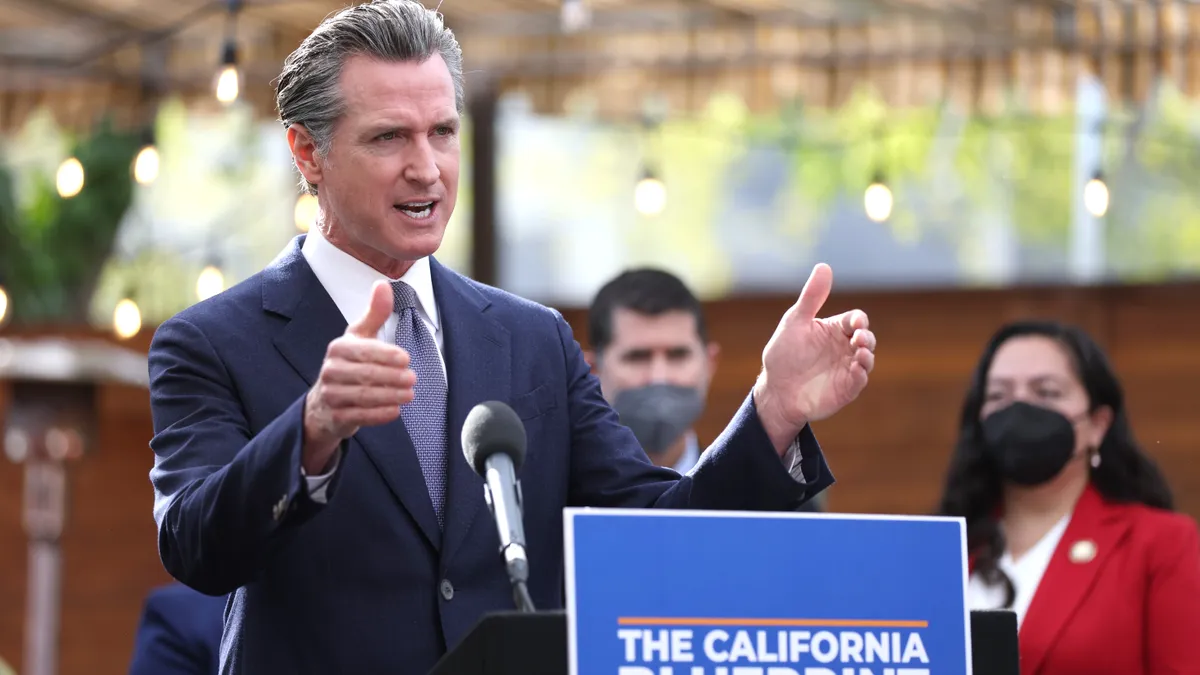Dive Brief:
- Save Local Restaurants, a political coalition backed by many of the nation’s largest restaurant brands, says it has collected enough signatures to trigger a statewide referendum on California’s FAST Recovery Act, per a National Restaurant Association press release emailed to Restaurant Dive. The law would create a council of state, labor and employer representatives to regulate fast food wages and conditions.
- Major restaurant chains, including Starbucks, McDonald’s and Chipotle, have already committed millions of dollars to efforts to defeat the FAST Recovery Act at the ballot box.
- California’s referenda have become a platform for confrontation between industry and labor in recent years, with restaurant delivery companies using the process to block a law classifying workers as employees, though the effort was later challenged in court.
Dive Insight:
Save Local Restaurants claims to have gathered more than 1 million signatures to support its referendum drive. Once those signatures are validated by California’s secretary of state, the implementation of the FAST Act is off the table until after Golden State’s 2024 general election.
“The fact this process puts this law on hold ensures that restaurants can operate without disruption in the meantime and diners won’t lose of the brands they love,” Michelle Korsmo, National Restaurant Association president and CEO, said in a press release emailed to Restaurant Dive.
The NRA, which has given at least $405,000 to back the referendum, said in a press release that the FAST Recovery Act would raise prices and harm operators. The NRA also claimed that the FAST Recovery Act, which would only apply to brands with more than 100 units nationally, would drive up wages outside the QSR sector, something proponents of the law see as a benefit.
The NRA said it was coordinating with policymakers and businesses to forestall attempts by labor advocates to pass similar legislation elsewhere in the country.
“The Association and our state restaurant association partners are mobilizing to engage with operators and lawmakers in areas we see as targets,” Sean Kennedy, NRA’s executive vice president of public affairs, said in a statement. “We’ll invest our time and resources in making sure this noxious legislation doesn’t spread.”
Save Local Restaurants has raised over $13.7 million to support its efforts to overturn the law, which was signed by Gov. Gavin Newsom on Sept. 5.
Though opponents of the fast food standards council established by the law have sought to frame the legislation as primarily impacting small businesses and franchisees, the three largest backers of the referendum are brands that do not franchise. Starbucks, which licenses stores and owns the majority of its locations, gave $2 million to support the referendum, and Chipotle, which does not offer franchising, has donated $2.75 million. In-N-Out, a California-based burger chain that does not offer franchising, also gave $2.75 million. Other major brands, including McDonald’s, Chick-fil-A and Yum Brands, have given more than $1 million each to Save Local Restaurants.
Supporters of the FAST Recovery Act denounced the referendum effort and vowed to continue pressing for the law.
“We will fight for as long as it takes to win a seat at the table. Instead of doing everything they can to work against us, corporations like McDonald’s and Starbucks must join us at the table and work with us to find solutions to the most pressing problems in fast-food,” Anneisha Williams, a Jack in the Box worker and organizer with Fight for $15 and a union, said in a press release emailed to Restaurant Dive.
SEIU President Mary Kay Henry, a key backer of the FAST Recovery Act, said California’s referendum process has allowed employers to nullify laws they do not like by pouring money into targeted ballot measures.
“Lawmakers must take a serious look at the referendum process and consider meaningful changes to ensure the referendum process reflects the will of Californians, not multinational, billion-dollar corporations,” Henry said in a press release.










